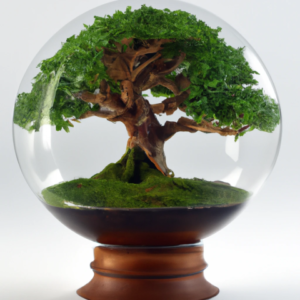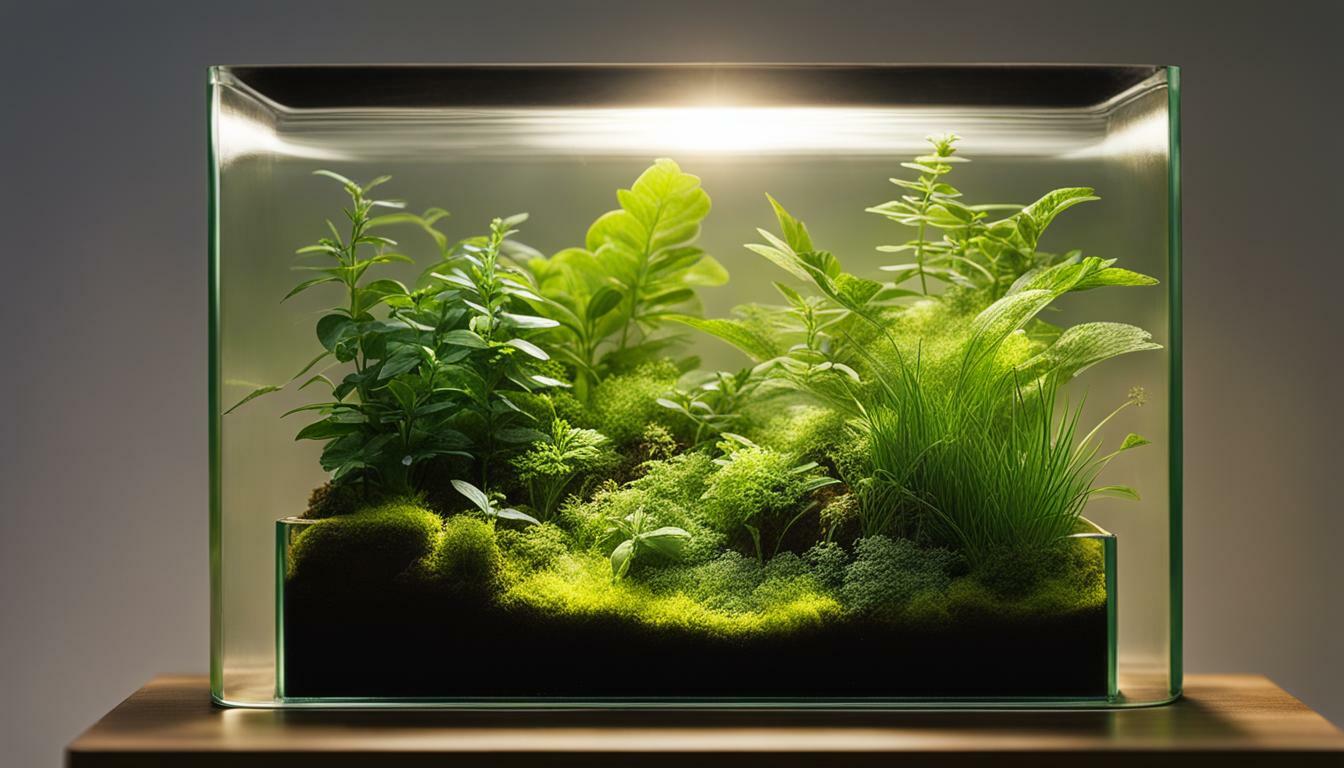Are you looking to bring the beauty of nature indoors? With Terrarium Plants Herbs, you can create your own little Eden right in your home. These low-maintenance green gems not only add aesthetic appeal but also bring serenity to any space. Whether you have a green thumb or are a beginner in gardening, terrarium plants and herbs are a perfect choice to brighten up your living space and enjoy the benefits of indoor gardening.
Imagine having a lush and fragrant oasis of greenery inside your home, where you can escape the stresses of daily life and reconnect with nature. Terrarium gardening allows you to do just that. It provides an opportunity to create miniature ecosystems, incorporating plants and herbs that thrive in a closed environment with limited space and resources.
- Terrarium Plants Herbs can transform your living space into a serene oasis of greenery.
- They are low-maintenance and perfect for both experienced gardeners and beginners.
- Terrarium gardening allows you to create miniature ecosystems in limited space.
- Choose from a variety of herbs like parsley, basil, chives, and sage for your terrariums.
- Little Eden offers unique terrariums made from recycled glass to enhance your indoor plant paradise.
Why Choose Terrarium Plants Herbs for Indoor Gardening?
When it comes to indoor gardening, Terrarium Plants Herbs are a perfect choice for both beginners and experienced gardeners alike. These delightful plants not only bring natural beauty into your home but also offer numerous benefits that make them an ideal option for indoor gardening.
One of the main advantages of Terrarium Plants Herbs is their low maintenance nature. They require minimal care and attention, making them perfect for busy individuals or those new to gardening. These plants thrive in a controlled environment, providing consistent growth and reducing the risk of pests and diseases.
Another reason to choose Terrarium Plants Herbs is their versatility. Whether you have limited space or want to create a stunning centerpiece, these plants can be grown in various containers, from simple pots to elegant terrariums. They can adapt to different lighting conditions, making them suitable for any room in your home.
Some recommended herbs for terrariums include parsley, basil, chives, sage, and marjoram. These herbs not only add fragrance and beauty to your indoor space but also provide fresh ingredients for your culinary creations. Imagine plucking fresh basil leaves from your terrarium to garnish a homemade pasta dish or adding freshly chopped parsley to your favorite soup recipe. The possibilities are endless!
By choosing Terrarium Plants Herbs for your indoor gardening adventures, you can create a tranquil oasis in your home while enjoying the benefits of fresh herbs all year round. Embrace the joy of growing your own Eden and experience the beauty and serenity that these green gems bring to your living space.
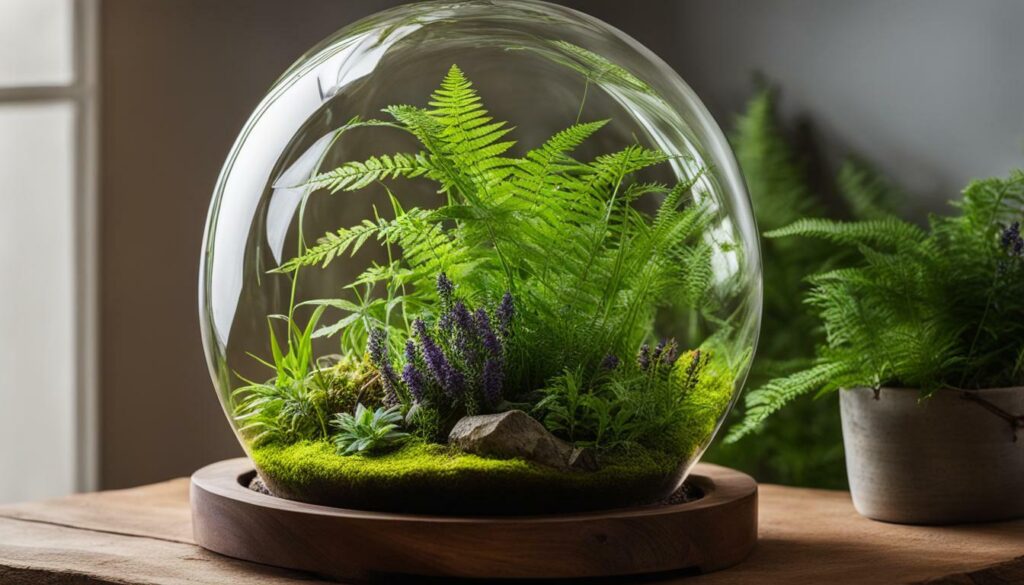
Recommended Herbs for Terrariums
There is a wide variety of herbs that thrive in terrarium environments, adding beauty, aroma, and flavor to your indoor space. Whether you’re a beginner or an experienced gardener, these herbs are easy to grow and maintain, making them perfect for terrarium gardening.
1. Parsley: Known for its vibrant green leaves and distinct flavor, parsley is a versatile herb that can be used in a variety of dishes. It thrives in terrariums and adds a fresh touch to your indoor oasis.
2. Basil: With its fragrant leaves and rich flavor, basil is a popular choice for terrariums. It pairs well with tomatoes, making it an essential herb for Italian cuisine.
3. Chives: Chives are a member of the onion family and have a mild onion flavor. These slender, green herbs add a touch of elegance to any terrarium and are perfect for garnishing salads, soups, and other dishes.
4. Sage: Known for its earthy aroma and robust flavor, sage is a must-have herb for any terrarium enthusiast. It pairs well with poultry and is often used in stuffing or seasoning blends.
To create a beautiful and aromatic indoor oasis, consider including these herbs in your terrarium. They not only enhance the visual appeal of your space but also offer the convenience of having fresh herbs at your fingertips.
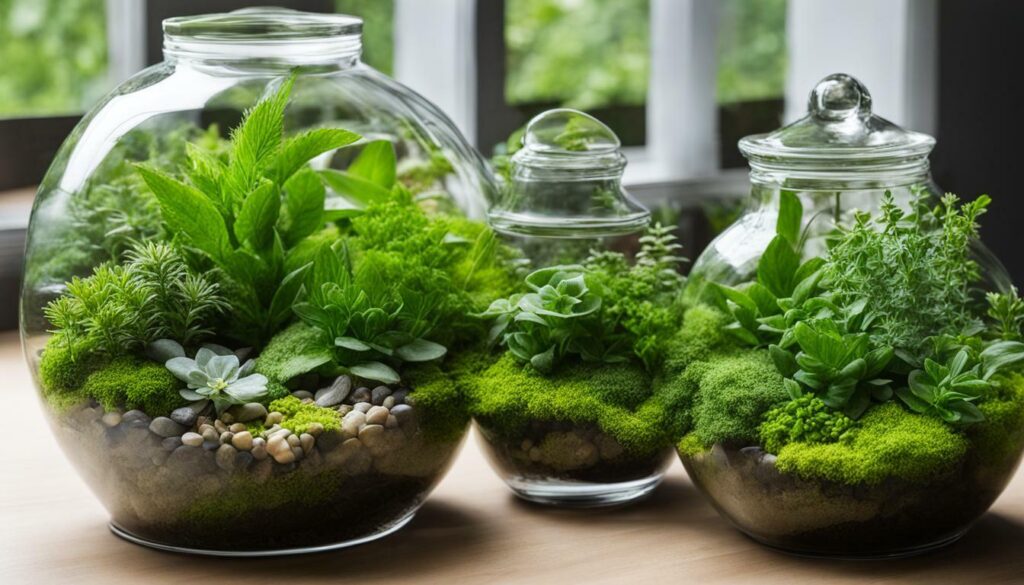
| Herb | Flavor | Uses |
|---|---|---|
| Parsley | Fresh, slightly peppery | Garnishing, seasoning |
| Basil | Sweet, aromatic | Italian dishes, pesto |
| Chives | Mild onion flavor | Garnishing, salads, soups |
| Sage | Earthy, robust | Poultry, stuffing, seasoning |
By including these recommended herbs in your terrarium, you can create a lush and fragrant indoor oasis that not only looks beautiful but also adds a touch of flavor to your culinary creations. Experiment with different combinations and enjoy the benefits of having fresh herbs right at your fingertips!
Creating the Ideal Growing Environment for Terrarium Plants Herbs
To ensure the success of your Terrarium Plants Herbs, it’s important to create an optimal growing environment that mimics their natural habitat. These low maintenance plants thrive in conditions that provide adequate light, humidity, and air circulation. Let’s explore some key factors to consider when setting up your terrarium.
Lighting
Proper lighting is essential for the healthy growth of Terrarium Plants Herbs. Most herbs prefer bright, indirect light. Place your terrarium near a window that receives filtered sunlight, or use artificial grow lights if natural light is limited. Keep in mind that different herbs may have specific light requirements, so research the needs of your chosen plants to ensure they receive the right amount of light.
Humidity
Terrariums create a naturally humid environment, which is ideal for many herbs. However, excessive moisture can lead to fungal issues and root rot. To maintain proper humidity levels, use a spray bottle to lightly mist the plants and terrarium walls. Monitor the moisture levels by touching the soil; if it feels damp, hold off on watering until it dries out slightly.
Air Circulation
Good air circulation is crucial for preventing mold and ensuring the health of your Terrarium Plants Herbs. Avoid sealing your terrarium completely, as this can create stagnant air. Instead, opt for a partially open or ventilated design. Gently open the lid or remove it for a short period each day to allow fresh air to circulate. Additionally, positioning a small fan nearby can help improve air movement within the terrarium.
| Lighting | Humidity | Air Circulation |
|---|---|---|
| Adequate, bright, indirect light | Mist plants and terrarium walls | Partially open or ventilated design |
| Research specific light requirements | Monitor soil moisture levels | Allow fresh air to circulate |
| Use artificial grow lights if needed | Position a small fan nearby |
By carefully considering these factors and providing the ideal growing environment for your Terrarium Plants Herbs, you can enjoy the beauty and benefits of an indoor garden year-round. Keep in mind that each herb may have unique preferences, so it’s essential to research and cater to their specific needs. Creating a thriving terrarium is a rewarding experience that brings nature’s charm into your home.
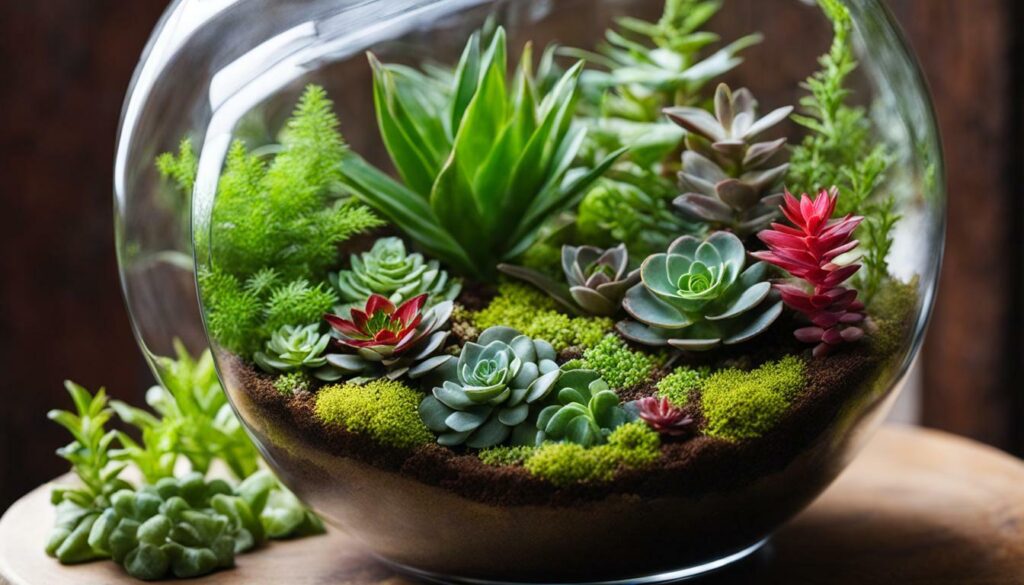
Choosing Containers and Potting Mix for Terrariums
Selecting the right containers and potting mix is vital for the health and longevity of your Terrarium Plants Herbs. When it comes to containers, there are several options to consider. You can choose from glass terrariums, open containers, or even repurpose old jars and containers. The key is to ensure that the container has good drainage to prevent waterlogging and root rot. Additionally, the container should be large enough to accommodate the growth of your herbs.
“The right container will not only provide a suitable environment for your terrarium plants, but it will also enhance the aesthetic appeal of your indoor space.”
For potting mix, it’s important to use a well-draining, nutrient-rich soil that will support the growth of your terrarium plants. You can create your own mix by combining equal parts of regular potting soil, sand, and peat moss. This blend will allow for proper drainage while retaining the necessary moisture for your herbs.
To ensure that your plants receive adequate light and air circulation, consider using a layer of activated charcoal at the bottom of the container. This will help filter any impurities and prevent odors. Additionally, adding a layer of small stones or pebbles on top of the charcoal will provide additional drainage and prevent the soil from becoming waterlogged. Finally, finish off with a layer of sphagnum moss to retain moisture and add a natural touch to your terrarium.
Table: Recommended Containers and Potting Mix for Terrariums
| Container Type | Advantages |
|---|---|
| Glass Terrariums | Provide a clear view of the plants and create a beautiful display. |
| Open Containers | Allow better air circulation and are easier to access for maintenance. |
| Repurposed Jars and Containers | Environmentally-friendly and cost-effective option. |
Remember, the right containers and potting mix will contribute to the overall success of your terrarium plants. Take the time to choose wisely and create a beautiful and thriving indoor oasis.
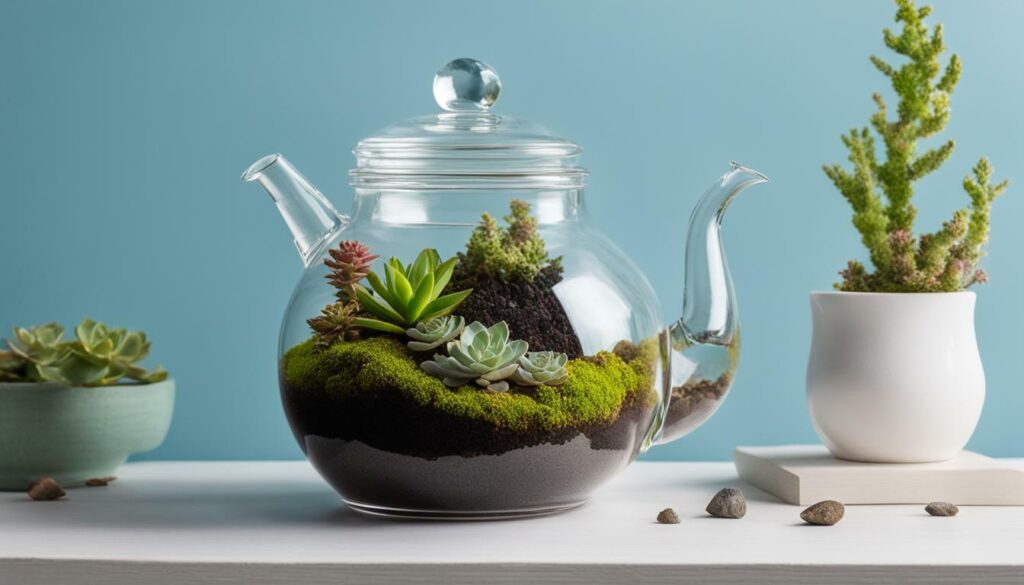
Proper watering is crucial for the success of your Terrarium Plants Herbs, and finding the right balance can be key to their long-term survival. Terrariums are unique miniature ecosystems that require different watering techniques compared to traditional potted plants. Understanding the moisture needs of your terrarium plants is essential to maintain their health and vitality.
When it comes to watering your terrarium plants, it’s important to strike a balance between providing enough moisture for growth and preventing excessive humidity that can lead to root rot and fungal diseases. The enclosed environment of a terrarium creates its own microclimate, trapping moisture inside and reducing the need for frequent watering.
One effective technique is to follow the “soak and dry” method. This involves thoroughly watering your terrarium until the excess water drains out through the bottom, and then allowing the soil to dry out completely before watering again. This ensures that the roots receive adequate hydration without becoming waterlogged.
Another important consideration is the type of water you use. Tap water may contain chemicals such as chlorine or fluoride, which can be harmful to your terrarium plants over time. It’s best to use distilled or filtered water to eliminate any potential contaminants.
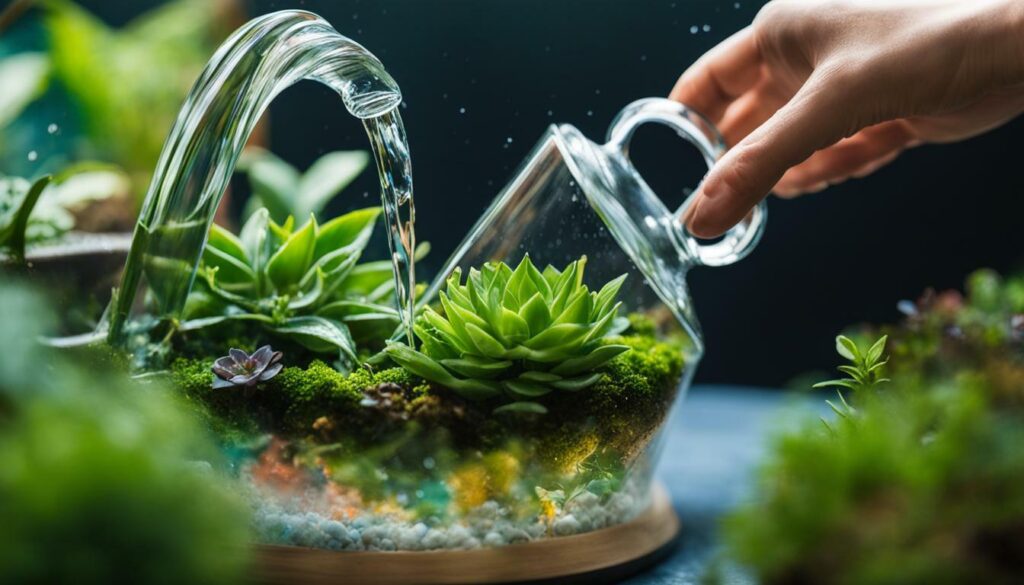
| Plant | Watering Frequency |
|---|---|
| Parsley | Once every 7-10 days |
| Basil | Once every 5-7 days |
| Chives | Once every 3-5 days |
| Sage | Once every 7-10 days |
| Marjoram | Once every 5-7 days |
Remember that the frequency of watering may vary depending on factors such as the size of your terrarium, the type of plants you have, and the environment they are in. Always monitor your terrarium’s moisture levels and adjust your watering schedule accordingly.
By mastering the art of proper watering, you can ensure the longevity and beauty of your Terrarium Plants Herbs. So, take a mindful approach and provide your miniature green oasis with the hydration it needs to thrive.
Harvesting and Using Herbs from Terrariums
Harvesting and using the herbs from your terrariums is a rewarding experience that allows you to enjoy the fruits of your indoor gardening efforts. Not only do these herbs add a fresh and aromatic touch to your home, but they also provide you with an abundant supply of flavorful ingredients for your culinary creations.
When it comes to harvesting herbs from your terrarium, it’s best to start by trimming the outer leaves or stems of the plant. This encourages new growth and prevents the herbs from becoming overcrowded. Use a sharp pair of scissors or gardening shears to make clean cuts just above a leaf node, which will stimulate further growth.
Once you’ve harvested your herbs, there are a multitude of ways to utilize them. Freshly picked basil leaves can be used to make homemade pesto or added to salads and pasta dishes. Chives can be chopped and sprinkled over baked potatoes or scrambled eggs for an extra burst of flavor. Sage leaves can be dried and used to make fragrant herbal teas or infused oils for cooking.
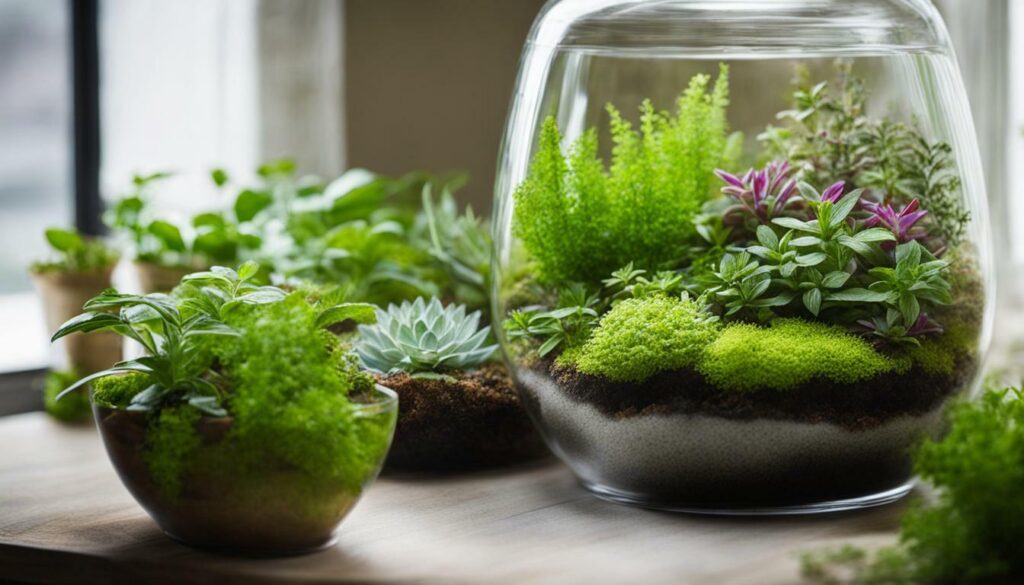
- Harvest herbs in the morning when their flavors are at their peak.
- Wash the harvested herbs gently to remove any dirt or debris.
- Dry the herbs thoroughly before storing them to prevent mold or rot.
- Store dried herbs in airtight containers away from heat and sunlight to preserve their freshness.
- Experiment with different herbs and combinations to create unique flavor profiles in your recipes.
Remember, the herbs grown in your terrariums are a testament to your green thumb and dedication to indoor gardening. So, don’t hesitate to reap the rewards and savor the flavors of your own homegrown herbs!
Little Eden: Unique Terrariums for Your Plant Paradise
Little Eden offers a beautiful collection of terrariums made from recycled glass, perfect for housing your Terrarium Plants Herbs. These unique terrariums not only provide a stunning display for your indoor garden but also contribute to sustainable living by repurposing materials. With their intricate designs and exquisite craftsmanship, Little Eden terrariums add a touch of elegance to any space.
Whether you’re a beginner or an experienced gardener, Little Eden has a terrarium to suit your needs. Their range includes various sizes and shapes to accommodate different plant arrangements. From small tabletop terrariums to larger floor-standing options, you’ll find the perfect container for your Terrarium Plants Herbs.
What makes Little Eden terrariums truly special is their attention to detail. Each terrarium is carefully crafted to ensure optimal growing conditions for your plants. With features like built-in ventilation and drainage systems, these terrariums provide a self-sustaining environment that requires minimal maintenance. You can create your own miniature ecosystem with confidence, knowing that your Terrarium Plants Herbs will thrive in their new home.
Enhance Your Indoor Oasis with Little Eden
Little Eden’s commitment to sustainability doesn’t end with their terrariums. They also offer a variety of eco-friendly accessories and potting mixes to enhance your indoor garden. From natural fertilizers to organic pest control solutions, they have everything you need to maintain a healthy and thriving terrarium. With their expertise and dedication to customer satisfaction, Little Eden is your go-to source for all things terrarium gardening.
| Terrarium Size | Dimensions (in inches) | Price |
|---|---|---|
| Small | 6 x 6 x 8 | $39.99 |
| Medium | 8 x 8 x 10 | $59.99 |
| Large | 10 x 10 x 12 | $79.99 |
Visit Little Eden’s website today to explore their stunning collection of terrariums and start creating your own plant paradise at home. With their high-quality products and exceptional customer service, Little Eden is the ultimate destination for terrarium enthusiasts.
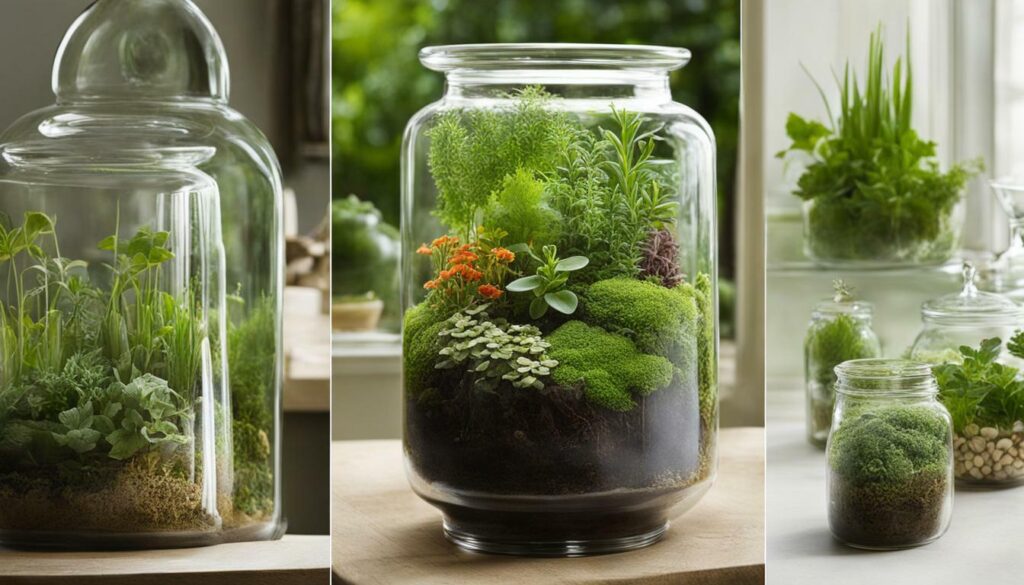
Joining a terrarium workshop is a fantastic way to delve deeper into the world of terrarium gardening and gain valuable knowledge and skills. These workshops provide hands-on experience and expert guidance to help you create your own miniature ecosystem.
During a terrarium workshop, you’ll learn the fundamentals of terrarium gardening, including the types of plants suitable for terrariums and the ideal growing conditions. You’ll explore different container options, potting mixes, and watering techniques to ensure the health and vitality of your terrarium plants. Additionally, experienced instructors will share tips and tricks for maintaining your terrarium and troubleshooting common issues.
Not only do terrarium workshops offer practical knowledge, but they also provide an opportunity to connect with fellow plant enthusiasts. You can exchange ideas, share experiences, and gain inspiration from others who share your passion for indoor gardening. These workshops often foster a sense of community, making them a fun and enjoyable learning experience.
| Benefits of Terrarium Workshops |
|---|
| Hands-on experience in creating a terrarium |
| Expert guidance and tips from experienced instructors |
| Opportunity to connect with fellow plant enthusiasts |
| Access to a wide range of plant species and materials |
| Enhanced knowledge and skills in terrarium gardening |
Whether you’re a beginner or an experienced gardener, attending a terrarium workshop can expand your horizons and take your terrarium gardening to the next level. So why not sign up for a workshop today and embark on a fulfilling journey of creating your own miniature ecosystem?
Book Your Terrarium Workshop Today!
To book a terrarium workshop and start your own indoor gardening adventure, visit [Workshop Provider’s Website]. Don’t miss out on the opportunity to learn, create, and connect in the wonderful world of terrarium gardening.
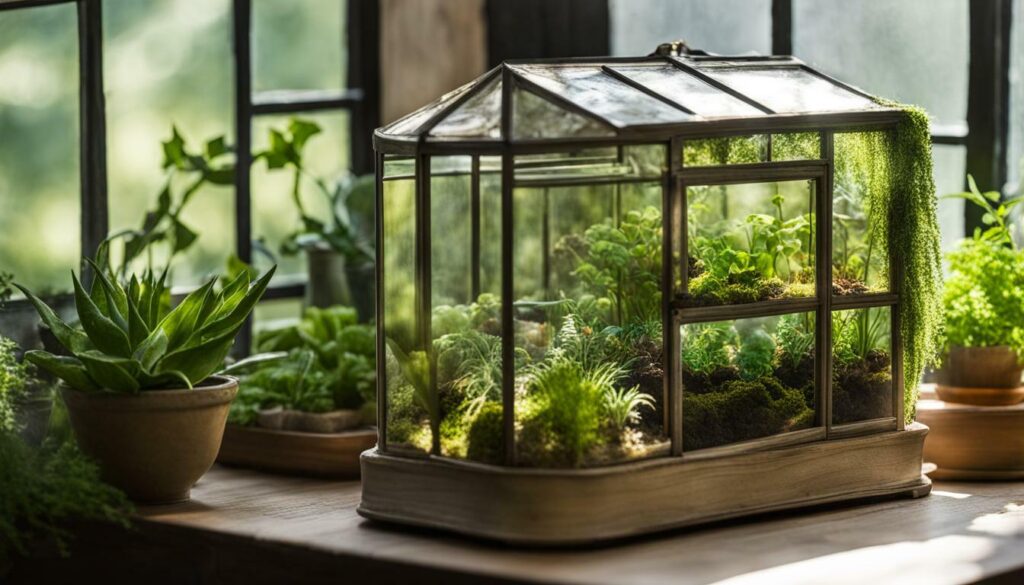
| Why Attend a Terrarium Workshop? | What You’ll Learn |
|---|---|
| Gain valuable knowledge and skills in terrarium gardening | Types of plants suitable for terrariums |
| Hands-on experience in creating a terrarium | Ideal growing conditions for terrarium plants |
| Expert guidance and tips from experienced instructors | Container options and potting mixes |
| Connect with fellow plant enthusiasts | Proper watering techniques |
| Enhance your indoor gardening skills | Troubleshooting common terrarium issues |
Taking Terrarium Plants Herbs to the Next Level: Small Conservatories and Greenhouses
If you’re ready to take your terrarium gardening to the next level, consider creating a small conservatory or greenhouse to house your beloved Terrarium Plants Herbs. These structures provide a controlled environment that allows you to cultivate a wider variety of plants and extend their growing season. By creating a microclimate, you can control factors such as temperature, humidity, and light, ensuring optimal conditions for your terrarium plants.
A small conservatory or greenhouse can be a stunning addition to your home, bringing nature’s beauty indoors while providing a dedicated space for your plants to thrive. With proper insulation, ventilation, and heating, you can maintain a stable environment year-round, protecting your Terrarium Plants Herbs from harsh weather conditions and pests.
When designing your conservatory or greenhouse, consider the layout and arrangement of your plants. Create different zones within the space, allowing for various humidity and temperature levels to accommodate the specific needs of different herbs. This way, you can grow a diverse range of Terrarium Plants Herbs, including those that require more warmth and moisture.
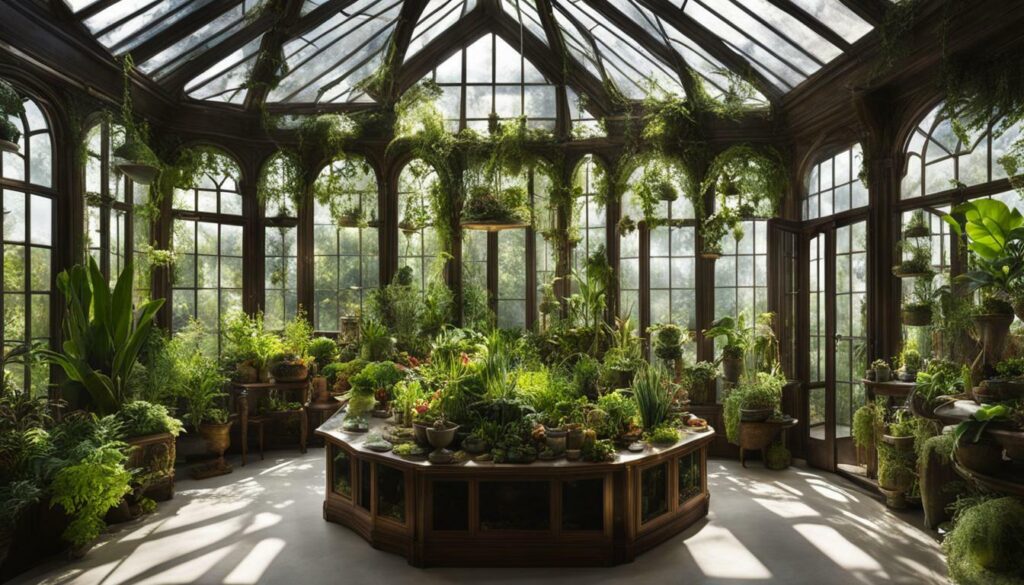
“A small conservatory or greenhouse can provide a controlled environment that allows you to cultivate a wider variety of plants and extend their growing season.”
Remember to choose a suitable heating system and install shading or blinds to protect your plants from excessive sunlight during the summer months. A table or shelving system can maximize space and provide different levels for your terrariums, allowing for an aesthetically pleasing display.
By creating a small conservatory or greenhouse, you can truly immerse yourself in the world of terrarium gardening. Experiment with different plant combinations, design unique landscapes, and indulge in the beauty and serenity of your own miniature ecosystem.
Tips for Maintaining Healthy Terrarium Plants Herbs
Maintaining the health of your Terrarium Plants Herbs requires some care and attention, but with a few simple tips, you can keep them thriving. Here are some guidelines to ensure your indoor garden flourishes:
- Lighting: Place your terrarium in an area that receives bright, indirect sunlight. Herbs need at least six hours of light each day to grow properly. If natural light is limited, consider using artificial grow lights to supplement.
- Containers and Drainage: Choose containers with good drainage to prevent waterlogging. Terrariums with drainage holes or layers of gravel at the bottom allow excess water to escape, preventing root rot. Remember to empty the excess water from the trays regularly.
- Potting Mix: Use a well-draining potting mix specifically formulated for terrarium plants. This mix should be lightweight, airy, and rich in organic matter. Avoid using garden soil as it can become compacted and hinder root growth.
- Watering: Proper watering is crucial to keep your herbs hydrated but not waterlogged. Check the moisture level of the soil regularly by sticking your finger about an inch deep. If it feels dry, water your plants until the excess drains out of the bottom. Remember, overwatering can lead to root rot.
Additionally, it’s essential to maintain proper humidity levels within your terrarium. Most herbs thrive in moderate humidity, so misting the plants occasionally or placing a small humidifier nearby can help create a suitable environment.
Regular pruning and harvesting are also important for the health of your terrarium herbs. Pinch off any yellow or wilted leaves to promote new growth and prevent diseases. Harvest the herbs frequently, as this encourages bushier growth and allows you to enjoy the flavors and aromas in your culinary creations.
Proper Care for Healthy Terrarium Plants Herbs
By following these simple tips and providing the right conditions, you can enjoy a thriving indoor garden filled with beautiful and aromatic Terrarium Plants Herbs. Whether you’re a beginner or an experienced gardener, the joy and satisfaction of growing your own herbs will enhance your space and bring nature’s beauty into your home.
| Tip | Description |
|---|---|
| Lighting | Place your terrarium in an area that receives bright, indirect sunlight. Consider artificial grow lights if natural light is limited. |
| Containers and Drainage | Choose containers with good drainage to prevent waterlogging. Empty excess water from trays regularly. |
| Potting Mix | Use a well-draining potting mix formulated for terrarium plants, avoiding garden soil. |
| Watering | Check soil moisture regularly and water when it feels dry, ensuring excess water drains out. |
Conclusion
Growing Terrarium Plants Herbs at home is a wonderful way to bring the beauty of nature indoors, adding serenity, fragrance, and a touch of green to any space. Whether you choose to start with simple pot plants or take it to the next level with extravagant terrariums or small conservatories, the joy of nurturing these green gems is unparalleled.
When it comes to indoor gardening, herbs are a fantastic choice. They not only provide fresh flavors for your culinary adventures but also offer a delightful aroma that fills the air. Consider adding popular herbs like parsley, basil, chives, and sage to your terrarium, or explore more unique options like marjoram for an extra touch of variety.
To ensure the success of your Terrarium Plants Herbs, it’s essential to create an ideal growing environment. Provide ample light for your plants, choose containers with proper drainage, and opt for high-quality potting mix to ensure healthy growth. Additionally, mastering the art of watering and harvesting will help your herbs thrive throughout the year, whether you’re using them in your favorite recipes or gifting them to loved ones.
If you’re looking to enhance your indoor plant paradise, consider exploring Little Eden’s collection of unique terrariums made from recycled glass. These beautiful creations will not only elevate the aesthetics of your space but also provide a perfect home for your Terrarium Plants Herbs. Little Eden also offers terrarium workshops to help you unleash your creativity and learn the art of creating your own miniature ecosystem.
In conclusion, growing Terrarium Plants Herbs at home is a rewarding endeavor that brings the wonders of nature into your everyday life. Create your own little Eden, and enjoy the benefits of greenery, serenity, and the fresh scents of herbs in your indoor oasis.
Can String of Pearls Plants be Included in a Terrarium with other Herbs and Plants?
Yes, string of pearls plants can definitely be included in a terrarium with other herbs and plants. When adding them, be sure to consider their growth habits and space constraints. Following the basic guidelines on how to grow terrarium plants will help ensure that all the plants thrive in the enclosed environment.
FAQ
What are Terrarium Plants Herbs?
Terrarium Plants Herbs are low-maintenance green gems that can be grown indoors in terrariums or pots. These plants add aesthetic appeal and serenity to any space.
Why should I choose Terrarium Plants Herbs for indoor gardening?
Terrarium Plants Herbs are a great choice for indoor gardening because they are low maintenance and can thrive in the controlled environment of a terrarium. They also add beauty and fragrance to your indoor space.
What are some recommended herbs for terrariums?
Recommended herbs for terrariums include parsley, basil, chives, sage, and marjoram. These herbs can be harvested and used in recipes, or simply enjoyed for their fragrance and beauty.
How do I create the ideal growing environment for Terrarium Plants Herbs?
To create the ideal growing environment, provide good light for your plants, use containers with good drainage, select high-quality potting mix, and maintain appropriate humidity levels.
What containers and potting mix should I choose for my terrarium?
Choose containers that have good drainage and are suitable for the size of your plants. For potting mix, select a high-quality, well-draining mix specifically formulated for indoor plants.
How should I water my Terrarium Plants Herbs?
Water your terrarium plants appropriately by allowing the soil to dry out slightly between waterings. Avoid overwatering, as this can lead to root rot.
How can I harvest and use herbs from my terrarium?
Harvest your herbs by snipping off the leaves or stems as needed. Use them fresh in recipes or dry them for later use. You can also give them as gifts or use them for decorative purposes.
Where can I find unique terrariums made from recycled glass?
Little Eden offers a selection of unique terrariums made from recycled glass. You can explore their collection to find the perfect terrarium for your indoor plant paradise.
Should I consider attending a terrarium workshop?
Attending a terrarium workshop can be a great way to unleash your creativity and learn how to create your own miniature ecosystem. It’s a fun and educational experience for all plant enthusiasts.
Can I take my terrarium gardening to the next level with small conservatories or greenhouses?
Yes, you can take your terrarium gardening to new heights by creating small conservatories or greenhouses for your Terrarium Plants Herbs. This will provide additional space and opportunities for your plants to thrive.
What are some tips for maintaining healthy Terrarium Plants Herbs?
Some essential tips for maintaining healthy Terrarium Plants Herbs include providing adequate light, proper watering, regular fertilization, and monitoring for pests or diseases.
